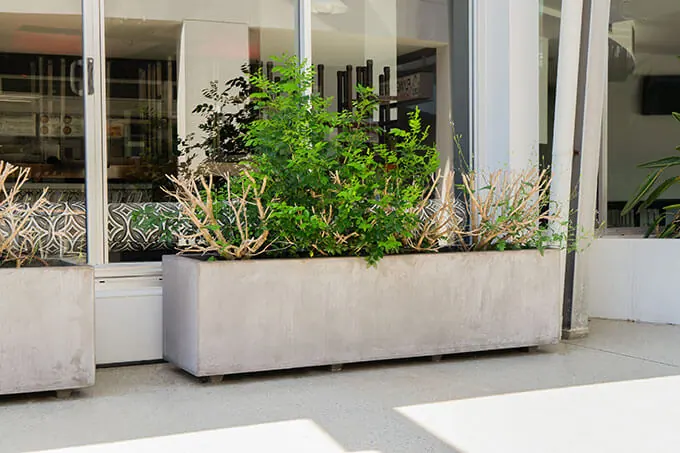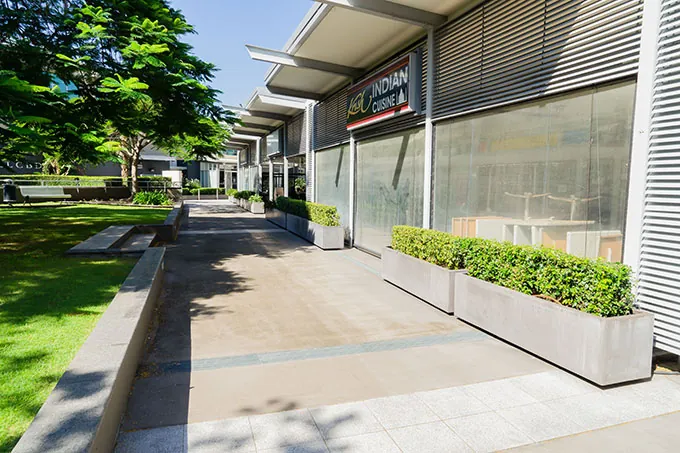Lightweight concrete planters, also called lightweight cement pots, have become a popular choice for gardeners and landscape architects in recent years. They offer a sturdy and stylish option for planting, but it’s important to understand the benefits and considerations that come with using them. In this article, we will be answering some of the most frequently asked questions about concrete pots so you can make an informed decision about whether they’re right for your landscape architecture and design project.
Are concrete pots good for plants?

Yes, concrete pots can be a good choice for plants. Concrete is a durable and long-lasting material. It can provide a sturdy home for your plants for many years. Concrete is a neutral material that won’t affect the soil. This kind of planter will provide your plants to have a healthy and stable environment to grow in. In reality IOTA’s concrete pots are over 90% fibreglass and really only look like concrete since fibreglass is stronger and better in all aspects.
Does concrete affect soil pH?
Yes, natural concrete can leach lime, which decreases soil pH and can harm plants until the concrete is aged or waterproofed. IOTA’s concrete-look fiberglass planters are pre-sealed, preventing pH imbalances and creating a neutral planting environment ideal for healthy plant growth.
Are cement pots waterproof?
Concrete pots can be made waterproof with a sealant, but it’s important to keep in mind that they are naturally porous. This means that they will absorb water over time, so it’s essential to ensure they are properly sealed if you plan to use them for plants requiring a lot of moisture. All IOTA’s planters are pre-sealed so all you have to do is add quality potting mix and plants.
Why do cement pots crack?
Cement pots can crack for a variety of reasons, including changes in temperature, exposure to the elements, and improper curing. It is important to keep concrete pots in a protected area and make sure they are allowed to cure properly before use. IOTA solves this problem by using a high quality fibreglass core with a robust concrete finish that is guaranteed not to crack
Is cement poisonous to plants?
No, cement is not poisonous to plants. However, it is important to make sure the concrete pot you choose is made with safe and non-toxic materials, as some additives can be harmful to plants and soil. Again IOTA’s planters tick this box as well.
Can plants break through concrete?
Yes, it’s possible for plants to break through concrete, especially if the concrete is of poor quality or if the planter lacks proper drainage. Over time, aggressive root systems can exploit weaknesses in the concrete, leading to cracks and potential damage to the planter.
IOTA’s concrete-look planters are engineered to prevent this issue. Our planters feature built-in drainage and raised feet to ensure optimal plant health. Unlike many concrete planters, IOTA planters are guaranteed not to crack, providing a durable and long-lasting home for your plants. By choosing IOTA, you’re investing in a planter that prioritises both the well-being of your plants and the longevity of your outdoor space.
How do you take care of concrete pots?
Taking care of concrete pots is relatively simple. To maintain their appearance, it’s important to clean them regularly and keep them sealed to prevent water absorption. An annual stone or fibreglass wax sealer is recommended.
Do concrete pots need drainage holes?
Yes, concrete pots should have drainage holes to prevent water from becoming trapped and damaging the roots of your plants. If the pot you choose does not have drainage holes, you should drill some yourself to ensure proper drainage.
Conclusion
Lightweight concrete planters offer a compelling blend of durability and style for gardeners and landscape architects. These pots provide a sturdy and aesthetically pleasing option for various planting projects. However, it’s essential to consider factors such as proper drainage and maintenance to prevent potential issues like cracking. By understanding the benefits and drawbacks of concrete planters, you can make an informed decision for your specific design needs.




0 Comments